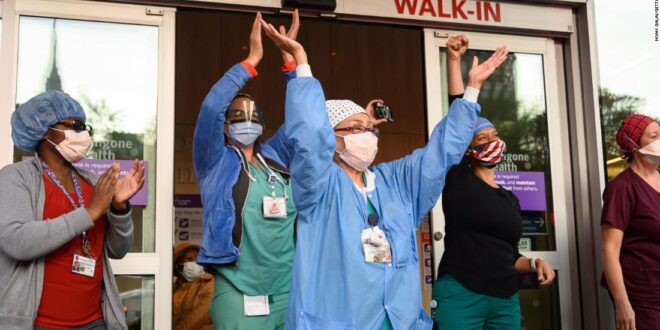Nonetheless, the overbearing Covid-19 pandemic saved it from entrance pages and ensured that a near-fatal blow to an endemic occurred with little fanfare.
“It doused the huge jubilation, and publicity, and recognition such a milestone deserves,” stated Dr. Tunji Funsho, the particular person extra accountable than anybody else for the eradication of untamed polio from Nigeria, and with it Africa.
However the second was “an enormous sigh of aid,” added Funsho, whose work as chair of Rotary Worldwide’s polio-eradication program in Nigeria earned him a spot on Time’s 100 Most Influential Folks of 2020.
“Having seen and held youngsters paralyzed by wild polio virus … that type of sight has grow to be historical past,” he informed CNN, the size of the accomplishment nonetheless wavering in his voice as he speaks. “No youngster ever once more can be paralyzed by the wild polio virus in Nigeria.”
Funsho’s yr reads like 2020 in reverse; slightly than watching a illness unfold indiscriminately and freeze the world in shock, he strangled the final embers of a distinct virus and unlocked large quantities of human potential.
However his just isn’t the one achievement to be misplaced amid the dizzying expedition that was 2020.
Even earlier than Covid-19 existed, people had an unmistakable and scientifically pinpointed tendency to imagine the world is poorer, angrier and extra unsettled than it truly is; an unconscious want to carry onto destructive stereotypes and ignore the size of progress unfolding proper in entrance of us.
It is a behavior picked up in childhood and bolstered by media protection and our personal psychological peculiarities, many specialists imagine. Put merely, we expect the world is a foul place that is getting worse — a way that undoubtedly grew within the final 12 months.
The one downside? We’re mistaken.
“I am a born optimist,” stated Funsho, reflecting on the challenges that his years-long effort encountered: from a Boko Haram insurgence that prevented youngsters in northern Nigeria from being vaccinated towards polio, to treacherous terrain that compelled his crew to journey by bike, donkey and camel to ship photographs.
“When the world comes collectively for one widespread function — to enhance the lives of each citizen on the planet, regardless of the place they reside — we are able to reach reaching that,” he stated. “I used to be fairly optimistic, and confirmed proper.”
Good issues continued to occur in 2020, whilst loss and isolation unfold on an epic scale.
And, in response to scores of scientists and information specialists, accomplishments like Funsho’s are rolling out consistently in a quickly bettering world. We’re simply not paying consideration.
‘That is most likely the perfect of occasions’
“In a world with a whole lot of issues, you are type of banned from speaking about good issues,” bemoaned Ola Rosling. Rosling is the co-author of a bestselling ebook, “Factfulness,” which sought to teach individuals about under-appreciated enhancements in world poverty, well being and wellbeing.
Rosling is one in every of a clutch of specialists forcing individuals to suppose otherwise about our world. And in 2020, their efforts are significantly poignant.
“Even throughout years with out a pandemic, persons are very reluctant to imagine that the world is best than it was once,” he informed CNN. “We may enhance the world lots. There are many issues,” he admitted. “However I believe the principle downside is our mindset.”
“We discovered that when members have been on the lookout for a class that grew to become much less widespread over time, they ‘expanded’ that class to incorporate extra issues,” the examine’s lead writer, David Levari, informed CNN. “So when blue dots grew to become uncommon, individuals known as a wider vary of colours blue. When threatening faces grew to become uncommon, individuals known as a wider vary of facial expressions threatening.”
“These findings recommend that when persons are on alert for one thing destructive that’s turning into much less widespread, slightly than celebrating their luck, they could begin to discover that destructive factor in additional locations than they used to,” he stated.
Outdated assumptions are handed down via generations, taught via childhood and bolstered by media protection of destructive, however distinctive, occasions, Rosling instructed.
And when issues get actually unhealthy, like in 2020, the human tendency to imagine the worst issues. “In our worldview, any large disaster instantly turns into the worst disaster ever,” Rosling stated.
“The world is in actually unhealthy form, however that is most likely the perfect of occasions,” he added. “And most of the people cannot think about that, due to how our brains are wired.”
Discovering positives in a tough yr
Negativity could also be a human tendency, however specialists say that difficult it could assist us put even a yr as cumbersome as 2020 in its correct context.
The pandemic, as an example, stalled efforts to resolve any variety of scientific achievements. Nevertheless it additionally lined up a string of accomplishments — and ensured that we spent much more time specializing in a brand new well being disaster, slightly than celebrating the truth that others are slowly however certainly nearing an finish.
One such milestone was clinched by a crew of medical doctors, together with virologist Ravindra Gupta, who cured HIV in an individual for less than the second time ever; an achievement made in 2019 that grew to become public information in March.
“It was actually large information,” Gupta informed CNN. “The primary time it occurred was practically 10 years in the past, and other people had not been in a position to do it once more, so individuals puzzled whether or not this was actual or whether or not it was a fluke.”
“It reinforces hope that a treatment for HIV is feasible,” stated Richard Jefferys, science venture director on the US-based Therapy Motion Group.
The pandemic additionally prompted a traditionally speedy vaccine that rewrote all the principles about how shortly such a shot might be produced.
“I believe it’s distinctive,” stated David Matthews, a Virology professor on the College of Bristol, of the a number of vaccine candidates to close or attain approval in 2020. “It is very important do not forget that at first of the yr we had actually no thought if any type of vaccine was attainable towards SARS-CoV-2.”
And the disaster additionally gave rise to a renewed appreciation of scientific work, in response to Peter Hotez, dean of the Nationwide College of Tropical Medication at Baylor School of Medication in Houston. “For the primary time that I can keep in mind, persons are listening to from scientists instantly frequently. And I believe individuals like what they’re listening to, [about] how we expect via an issue, how we make assessments, how we react to completely different conditions,” he informed CNN.
“I believe that is a extremely vital and constructive growth, and one we have to construct on.”
Progress begets progress: as wild polio was stifled in Africa, Funsho informed CNN his crew shortly repurposed their operation to deal with Covid-19 within the area, shielding it from the virus in a method that will in any other case been not possible.
And the disaster could have had even deeper implications elsewhere. “This pandemic helped us see all of the precise actors of what we name society — all these individuals in uniform, who have been at all times talked unhealthy about,” stated Rosling.
“I believe it is sharpening our seriousness about what a society actually is and the type of solidarities wanted to maintain it working.”
In the meantime, Rosling is eager to focus on the regular however very important enhancements that occurred within the background.
“The developments that actually kind and form the lives of the longer term era are issues that by no means present up within the information,” he stated. He cited rising entry to electrical energy, the decline of mortality in childbirth and progress towards illnesses akin to malaria and polio as sources of sunshine that shone all year long.
“To appreciate how good the world is and what number of issues are bettering, you first need to confront individuals’s worldview and present them that really, no, you are mistaken lots,” he summarized.
“Being conscious of the progress makes you understand that the issues you hear about tonight, you hear as a result of we will attempt to remedy them.”
“Issues are for fixing,” Rosling concluded. “And we now have managed to resolve the most important issues traditionally.”
 Top Naija News – Nigeria News, Nigerian News & Top Stories Top Naija News – Nigerian Newspapers, Nigerian News. topnaijanews is a daily Nigerian newspaper covering Latest News, Breaking News, Entertainment, Sports, Lifestyle and Politics.
Top Naija News – Nigeria News, Nigerian News & Top Stories Top Naija News – Nigerian Newspapers, Nigerian News. topnaijanews is a daily Nigerian newspaper covering Latest News, Breaking News, Entertainment, Sports, Lifestyle and Politics.




